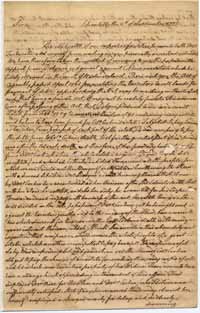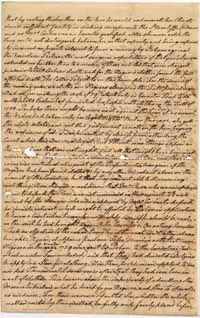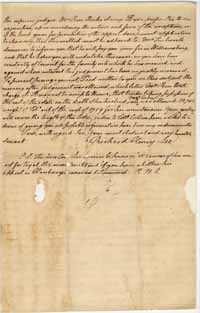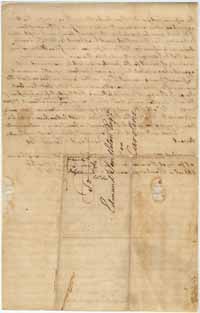Letter from Richard Henry Lee to Edmund Pendleton dated September 2, 1772
CWF Rockefeller Library Special Collections. SCMS1931.4.04

Chantilly the 2d of September 1772
Sir
The ill health of our respective families presents both Mr.
Turbeville and myself from waiting on you presonally as we had intended.
We have therfore taken this method of conveying to you the papers in the
appeal from Dobyns's judgment against Corbins executors which he
lately obtained in the court of Westmoreland. I have sent you the Act of
Assembly passed April 1761 for enabling the Executors to sell lands for
payment of debts; apprehending that it may be wanting in the dis[pute]
and that being a private Act, it may not be readily found. It was some
time after the passing of this Act, that Dobyns produced to me an acount
dated from Feby 1759 to sometime the close of 61 containing many articles
said by him to have been found for Colo
Corbins estate. I objected to pay, because
as Executor, I was possessed of such part of the estate only as was necessary to pay
the debts prior to Colo
Corbins death, that for the greatest part of his [illegible]d
was after the Colonels death, and therefore if due from any lack [rubbing] be
from Mrs. Corbin, [rubbing] of the debts
excepted) and who had hitherto, and did then receive all the profits; for
which reason I could not think myself justified to in burthening the Heir
with a demand like his. Mr Dobyns as well knowing this, as that it was
by Mrs. Corbin he was continued as her Overseer after the Colonels death, that
with her alone he settled, and to her only he accounted for his Corp[rubbing]
I never concerned myself with business of this sort, the estate being as the
will directed in the sole possession of Mrs. Corbin; yet he brought suit
against the Executors jointly, and to the injury of the Heir, has [recovered]
his whole demand for two years after Colo
Corbins death, with many
years interest thereon; which I think Sir [involves] this absurdity and
injustice, that one person shall receive the whole profits of a great,
estate, whilst another is compelled to pay bear all the expences of it.
So by this unprincipled judgement, we see the Heir of Colo
Corbin
obliged to pay the charges of an estate for making those very crops of 1760
and 61 which were the entire property of his Widow. There seems to have
been a strange kind of proceeding in the conduct of this affair. That
employed Mr Rose. for the Heir, and Mrs. Corbin (who I believe was
sufficiently satisfied, that if any perso[n] owed this money, it must be
herself) employed a Lawyer merely for delay, and he clearly
discovering
 that by casting this burthen on the heir he would exhonerate his Client,
that by casting this burthen on the heir he would exhonerate his Client,
shou'd sufficient facility in making concessions to the Plaintiffs Advocate
and as Mrs. Corbin was an Executor qualified, altho she never acted, the
Jury could not distinguish between her in that capacity, and being separate
-ly concerned in private interest to favor a recovery by Dobyns against
the Executors. I believe the most sanguine expectations of Dobyns's Lawyer
extended no further than to a recovery of those articles that were charged
previous to Col Corbins death, and for the Negroes clothes found the fall
after his death. The latter I object to on this principle. For the service of
the coming year, we clothe our Negroes always in the Fall preceding.
And as for making the crop of 59 (which only as Executor I had to do
with) Colo
Corbin had furnished his people with cloths in the Fall of
1750. Perhaps there might be more said against the heir, if, as usual,
the Widow had taken only her legal rights. But in this case, she gets
the whole estate, and yet this judgement insists on the heir paying
the expences of it. I was prevented by illness from attending the
Court when this [rubbing] was tryed, but I think some things appear in
the [rubbing]ions that are not right; and all that might have been made
appear on the [rubbing]is not [rubbing]n [rubbing]id, that [rubbing]
cause was continued at request of the Defendants, to enquire if the
Negroes had been found cloths &c. by any other [illegible]ant above on the
account of the Executors, but that they were not able to discover any
such thing. Now Sir you must know that Mr. Rose who was employed
[by me] to defend the Heir, was not concerned in this request. It was
moved by the Lawyer who was employed by Mrs. Corbin to defend
her private interest, which might be affected by Dobyns's application
to her in a court where business was quickly done if he should be cas[t]
in the suit he had brought against the Executors. As acting Executor
I had no objection to the case being tryed the next court after it was
brought. Again, it appears from one [Jesse] Morris's oath that [nine]
Negroes in the winter year 1759 was sent by Dobyns to the Executors (in
which number I am included) and that they had directed Dobyns
to apply to a Store for clothing. Now these people never applied to me
nor did I know until some years after that they had ever been in
want of clothes. This however shows the impropriety of admitting this
Morris to declare what he heard from Negroes, and this to operate
as evidence. For these reasons I doubted Sir, whether the whole
matter could by this method be fully and fairly placed before
 the superior judges. Mr Rose thinks it may. [If] you prefer this to an
the superior judges. Mr Rose thinks it may. [If] you prefer this to an
injunction, upon considering the nature and force of the exceptions, on
if the bond given for prosecution of the appeal does prevent application
to chancery, then this method must be adhered to. Mr Turberville
desires me to inform you that he will pay you your fee in Williamsburg,
and that he hopes you will undertake this cause, as you have been
constantly of Council for the family into which he has married, and
against whose interest this judgement has been unjustly recovered.
To prevent [illegible]engagement, I had written to you on this subject the
morning after judgement was obtained, which letter Mr. Rose took
charge of. It may not be amiss to observe, that besides taking possession of
the rest of the estate on the death of her husband sheMrs Corbin was allowed 12,000
weight of Tobo out of the crop of 1759 for her maintenance. Your good[ness]
will excuse the length of this letter, justice to Colo Corbins heir, added to a
desire of giving you all possible information have been my inducements
I am, with regard Sir, your most obedient and very humble
Servant
Richard Henry Lee
P. S. The hon Col desires to know what causes of his are
set for tryal the next Court and if you know whither his
appeal in [Han]bury's cause is determined. RHL
